Wunderlist is an app for lists, loved by many, but gone for good as of May 6, 2020. The website encourages existing users to download and use Microsoft To Do in its place. That's tempting because it makes it easy to import all of those lists you've made over the years. Then again, maybe it's a chance to Marie Kondo those lists and pare things down. Do you really need 30 lists? (Apparently, I've decided that I do, so I won't judge.)
I have lists for all sorts of things, from "Plants for the garden 2020" to "Gifts for the husband." Some are checklists, some are To Do lists, and some are lists for list's sake.
For my husband and me, the most useful list is our shared grocery list. We both have the app on our phones, we both add things to the list, we review it together but separately on our phones before he goes shopping (yes, you read that correctly), and he checks things off as he puts them in the cart. It makes the whole thing surprisingly efficient, and I think we save some money because we're into sticking to THE LIST.
While its users loved it, Wunderlist isn't entirely unique. There are a gazillion list apps out there. With Wunderlist, I've specifically enjoyed its combination of simplicity and design, and that it managed to implement useful features like sharing and collaboration with others, dynamics checkboxes for lists, and a great user experience across both mobile and web interfaces. I've also enjoyed using it for a list that isn't an "active" document: a list I don't review weekly or make regular progress on—like my many lists I've used for brainstorming an idea (including that novel I've been meaning to write...).
From the many wonderful articles we've published over the years, I've curated a list of open source alternatives to Wunderlist that may work for your needs, from simple task management and to-do lists to complex note-taking and process management. Or, if you are that person scribbling tasks and notes on paper scraps and post-it notes that are lying... er, around somewhere and everywhere... this might be a good time to try one of these digital options out.
Tasks—works with OwnCloud
Tasks is a free and open source app you can install from F-droid. Tasks is a mobile-only application, but it's extremely flexible in what it can sync to. You can save your lists to NextCloud or OwnCloud, Google Tasks, Apple Reminders, and just about any CalDAV server you have an account on.
The default view of Tasks is a daily view, so any task you enter is assumed to be a task from today onward. If you're like me and you want to maintain several unique lists, you can do that with Tags. When you create a tag, you create a category for tasks. You can assign a colour and an icon so each list of tasks is unique.
It takes a little getting used to, but tagging has many advantages. Because all tasks are tagged, you can view groups of tasks by clicking the tag you want to filter for, but you can also filter by day and even by place. That means that when you go grocery shopping, your grocery list becomes the active default list, and your everyday life list becomes active again when you return home.
By syncing your data to one of your online accounts, you can share lists with loved ones, collaborators, and colleagues.
Another great feature is that if you the same tasks every morning when you get to work, or the same 20 items in your weekly grocery list, you can create tasks that repeat on a regular basis.
Reviewed by Seth Kenlon
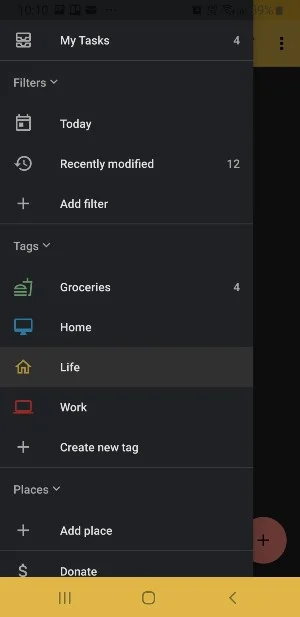
OpenTasks—best for long lists
OpenTasks is an excellent task management tool for creating individual tasks with a wide variety of settings. It supports a wide range of fields when creating a task, ranging from basic things, such as name and description, to more complex items, such as choosing if the task is private, public, or confidential. The biggest thing that sets OpenTasks apart from the alternatives is its use of tabs on the app's main screen. These tabs quickly allow you to see the tasks due, tasks starting soon, tasks sorted by priority, and tasks sorted by current progress towards completion. Many of the other apps support doing things like these, but OpenTasks quickly easily accesses these lists.
Read the full OpenTasks review by Joshua Allen Holm
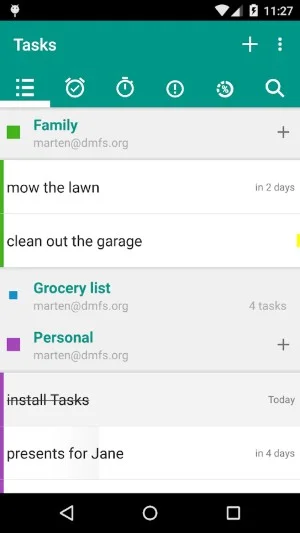
Mirakel—great for nested lists
Mirakel is a task management app with a modern user interface and support for just about every format you might want in such a program. At Mirakel's basic level, it supports multiple lists, which are referred to as "meta lists." Creating an individual task has a plethora of options with deadlines, reminders, progress tracking, tags, notes, sub-tasks, and file attachments, all comprising a part of a task's entry.
Read the full Mirakel review by Joshua Allen Holm
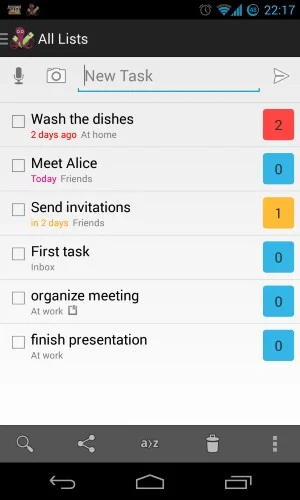
Todo—simple and effective, works anywhere
Todo.txt is one of the two to-do list and task management apps that I keep coming back to over and over again (the other is Org mode). And what keeps me coming back is that it is simple, portable, understandable, and has many great add-ons that don't break it if one machine has them and the others don't. And since it is a Bash shell script, I have never found a system that cannot support it. Read more about how to install and use Todo.txt.
Read the full todo.txt review by Kevin Sonney
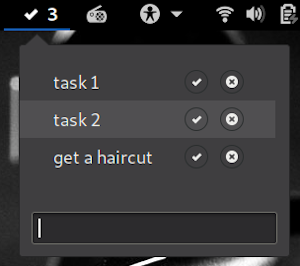
Joplin—best for private lists
Joplin is a NodeJS application that runs and stores information locally, allows you to encrypt your tasks and supports multiple sync methods. Joplin can run as a console or graphical application on Windows, Mac, and Linux. Joplin also has mobile apps for Android and iOS, meaning you can take your notes with you without a major hassle. Joplin even allows you to format your notes with Markdown, HTML, or plain text.
Read the full Joplin review by Kevin Sonney
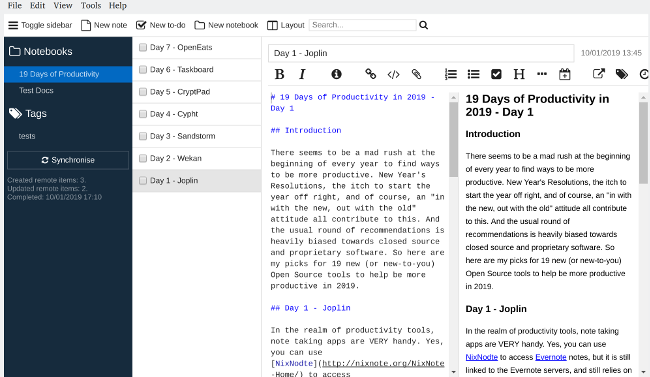
CherryTree—great alternative to Evernote / OneNote / Keep
CherryTree is a GPLv3-licensed application that organizes information in nodes. Each node can have child nodes, allowing you to easily organize your lists and thoughts. And, child nodes can have their own children with independent properties.
Read the full CherryTree review by Ben Cotton
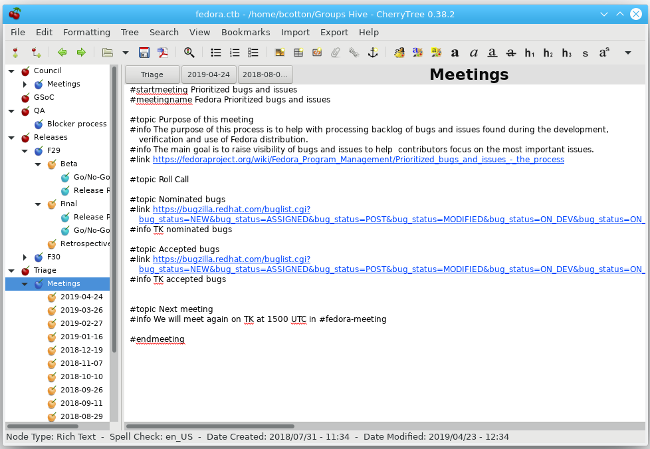
Bonus: Wekan—for fans of Kanban
Kanban boards are a mainstay of today's agile processes. And many of us (myself included) use them to organize not just our work but also our personal lives. I know several artists who use apps like Trello to keep track of their commission lists as well as what's in progress and what's complete. But these apps are often linked to a work account or a commercial service. Enter Wekan, an open source kanban board you can run locally or on the service of your choice. Wekan offers much of the same functionality as other Kanban apps, such as creating boards, lists, swimlanes, and cards, dragging and dropping between lists, assigning to users, labeling cards, and doing pretty much everything else you'd expect in a modern kanban board.
Read the full Wekan review by Kevin Sonney
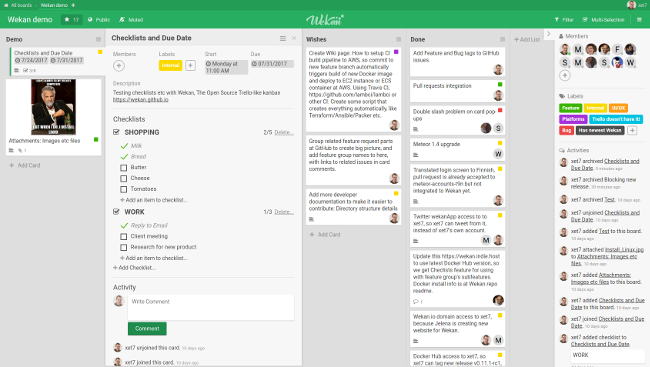

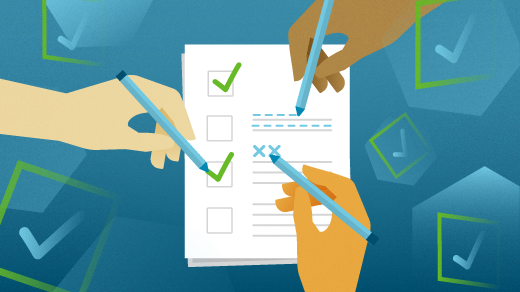


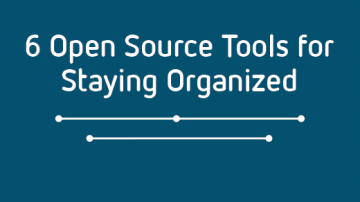





10 Comments